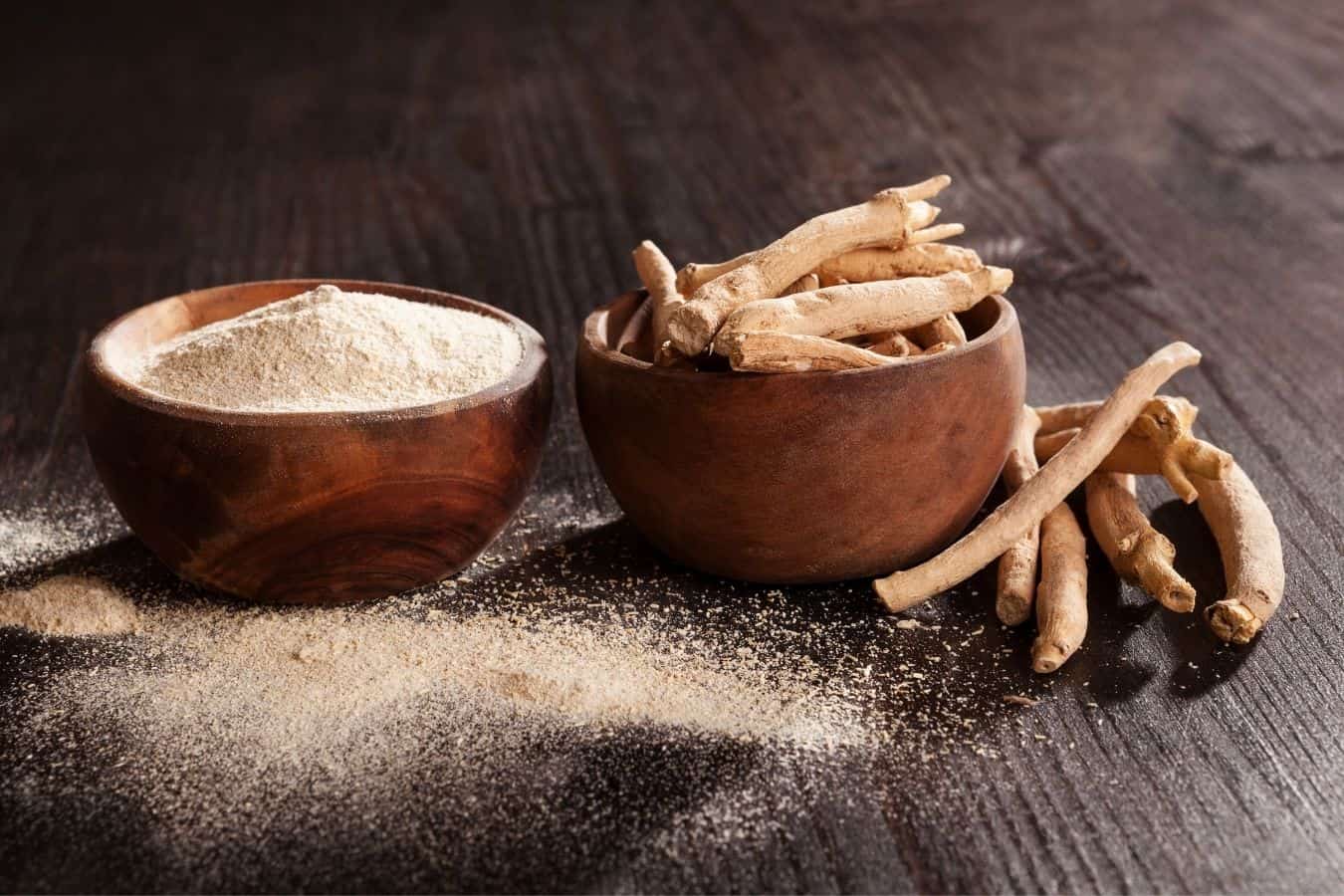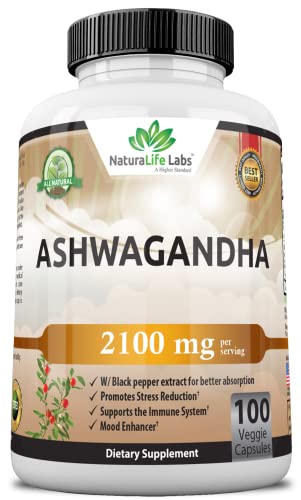Going gray is something that many people try to avoid. Fortunately, there are natural ways to combat this sign of aging, like ashwagandha. Read on to learn what this plant is and how to use ashwagandha for gray hair.

This post contains affiliate links and we may earn if you click on them (at no extra cost to you). Please read our full disclosure policy here.
What is Ashwagandha?
Ashwagandha has become a trendy supplement in recent years, but its history is much more expansive.
It’s been used to treat many ailments for more than 8,000 years in several regions like India, Africa, and the Middle East, where it grows natively.
More specifically, it plays a vital role in Ayurveda, India’s oldest healing system. It’s also known as Indian Ginseng because of its energy-boosting properties.
It’s a reddish-orange berry that grows on a leafy plant that reaches about three feet in height.
Although the berries and leaves are known to have therapeutic qualities, it’s actually the roots that people seek out.
That’s because the root has been shown to boost the production of (Dehydroepiandrosterone) DHEA. This hormone is naturally produced in the adrenal gland and produces other hormones like testosterone and estrogen.
These hormones decrease as we get older, which leads to common signs of aging like lack of energy, lowered skin elasticity, and muscle atrophy.
Benefits of Ashwagandha For Hair
There are plenty of benefits of ashwagandha for hair because it is an adaptogen—or stress and inflammation reducer. These qualities alone have a significant impact on your hair’s health, including:
Reduces Hair Loss
Hair loss can occur for many reasons, like stress and drops in hormone production again.
Ashwagandha has been shown to fight against both through its mood-boosting effects and promoted DHEA production.
Strengthens Hair
Ashwagandha’s purported ability to increase DHEA has even more benefits, like fighting against free radicals.
But, unfortunately, exposure to these can weaken body cells that create noticeable signs of aging, like going gray.
Regular ashwagandha use may be able to counteract this, keeping our hair healthy and strong.
Conditions Scalp and Hair
The DHEA stimulation also works to condition the hair and scalp because it increases collagen and sebum production.
Both of these things provide necessary compounds that help keep our hair and scalp moisturized and strong.
Nourishes the Hair and Scalp
Just like the rest of our bodies, our hair and scalp need proper nourishment to remain healthy.
Ashwagandha can give these areas the nutrients they need since it’s rich in Vitamin C, protein, glucose, iron, and potassium, all required for hair growth.
Prevents Scalp Irritation
Ashwagandha is a potent anti-inflammatory, making it perfect for soothing and preventing scalp irritation.
Your scalp can become irritated for various reasons, including eczema, psoriasis, dry air, allergies, and dandruff.
With benefits like these, you might be wondering about ashwagandha and gray hair. Keep reading to find out.
Also Read: Cactus For Hair: 7 Incredible Benefits And How To Use)
Is Ashwagandha Good For Gray Hair?

Melanin is the pigment cells that give our skin, hair, and eye color, but as we age, the pigment cells in our hair begin to die, leading to gray hair.
However, these cells can fade out at any age, meaning you can start to lose your hair color prematurely.
Ashwagandha can potentially change this, though, because it prevents melanin loss. In fact, it actually boosts melanin production! So, with regular use, you might notice a reduction in the number of gray hairs you have and maintain your natural hair color longer.
Not only that, ashwagandha will make gray hair healthier. This is because gray hair doesn’t just lack pigment; it also lacks the strength of colored hair.
The melanin acts as an extra barrier, and without it, the cuticle becomes thinner. This makes the strand weaker and more susceptible to damage.
It also means that your hair doesn’t retain water as well, making it drier. Fortunately, ashwagandha can combat this too.
Since it conditions, nourishes, and strengthens the hair and scalp, you can keep your gray hair healthy and resilient.
Overall, adding this root to your hair care routine might make a big difference in your hair’s health.
How to Use Ashwagandha on Hair
If you want to take advantage of the benefits of ashwagandha and gray hair, you have a few options at your fingertips.
Use an Ashwagandha Hair Mask
Hair masks are an excellent way to give your tresses a deep surge of moisture in a short amount of time.
Best of all, you can make your ashwagandha hair mask using ground root powder like this:
Ashwagandha Hair Mask Recipe
Ingredients
- 2 Tbsp Brahmi Powder
- 2 Tbsp Ashwagandha Powder
- Milk for making the paste
Directions
- Combine all three ingredients to make a paste with medium consistency—not too thick or too thin
- Massage the mask onto your scalp, and allow it to sit for a half-hour
- Thoroughly rinse out with lukewarm water
- For the best results, apply this mask twice a week
Ashwagandha Infused Hair Products
Several ashwagandha-infused hair care products on the market can rejuvenate your hair. This antioxidant shampoo, for instance, is perfect for energizing your scalp and strengthening your hair.
Drink Ashwagandha Tea
Drinking ashwagandha tea daily is a soothing way to incorporate it into your daily routine. Not only can it lead to improved hair quality with fewer grays, but it may also give you more energy and boost your mood.
Massage in Ashwagandha Oil
Treat your scalp to regular massages with ashwagandha oil to ease irritation while conditioning and nourishing.
Take Ashwagandha Supplements
Taking ashwagandha supplements is a simple way to include it in your diet.
Step by Step Guide
If you’re ready to combat the effects of aging naturally, here’s a step-by-step guide for how to use ashwagandha for gray hair.
Step 1.
Decide which of the above methods you want to use to make ashwagandha part of your hair care routine. For example, if you only want to use it on your hair and scalp, shampoos, hair oils, and other products are probably the best.
Step 2.
Do your research to find the safest ashwagandha products. Make sure to choose ones that are highly rated with a large customer base. It’s also essential to check out the manufacturer’s website and see how transparent they are about their process.
Step 3.
Once you have your ashwagandha products, it’s time to add it to your routine! If you decide to take supplements, take the recommended dosage. Or, if you choose to use hair masks or oil, use it about two times a week. It just depends on what you decide to use.
Also Read: How To Use Black Tea For Hair (Easy Guide)
What Results Can I Expect?
With regular, daily use of ashwagandha, you can expect to see a significant difference in the health of your hair and scalp.
Your hair will feel softer, stronger, and you’ll experience a lot less shedding.
If you’ve struggled with a dry or irritated scalp, then ashwagandha will calm the skin by reducing inflammation.
This, in turn, will lead to less itchiness and flakiness, which will further promote hair growth and retention.
Are There Any Side Effects?
While ashwagandha is a natural supplement that’s been used for thousands of years, you should still exercise caution when using it.
That’s because there has not been enough research to prove its benefits or potential side effects.
The lack of research also means that there aren’t officially recommended doses.
Generally, people can tolerate small to medium amounts regularly, but taking large amounts can lead to an upset stomach, vomiting, diarrhea, and nausea. This may be due to irritation in the intestinal lining, but more research is needed once again.
That being said, ashwagandha is considered safe, but it’s essential to select the products you use carefully.
Since the Food and Drug Administration does not regulate it, there are no manufacturing standards for the producers.
So it’s crucial to do your research before buying any ashwagandha root products.
It’s also important to avoid taking it if you’re pregnant because it may cause stress on the fetus and can potentially lead to premature labor.
If you have any other health conditions, it’s always best to speak to a doctor before supplementing your diet with ashwagandha.
Disclaimer: This site is not intended to provide professional or medical advice. All of the content on LovedByCurls.com is for informational purposes only. All advice should be followed at your own discretion. Ingredients may change at any time so always check the product label before using. Check our full disclaimer policy here.




